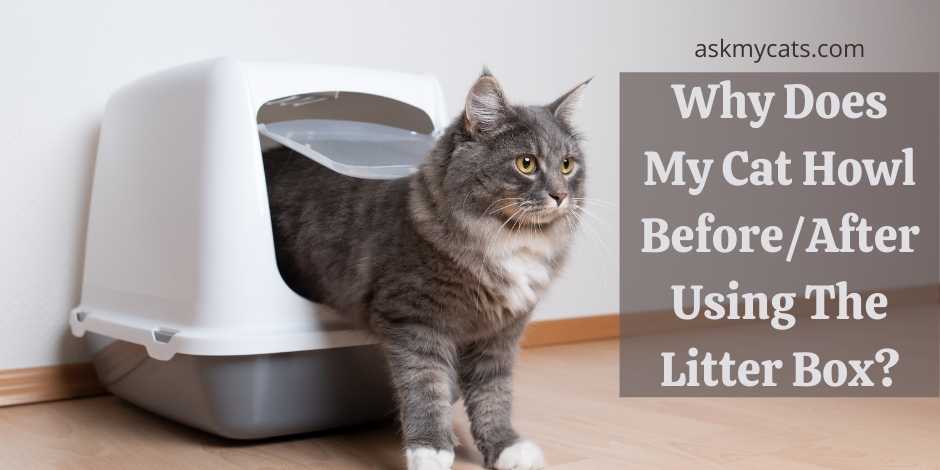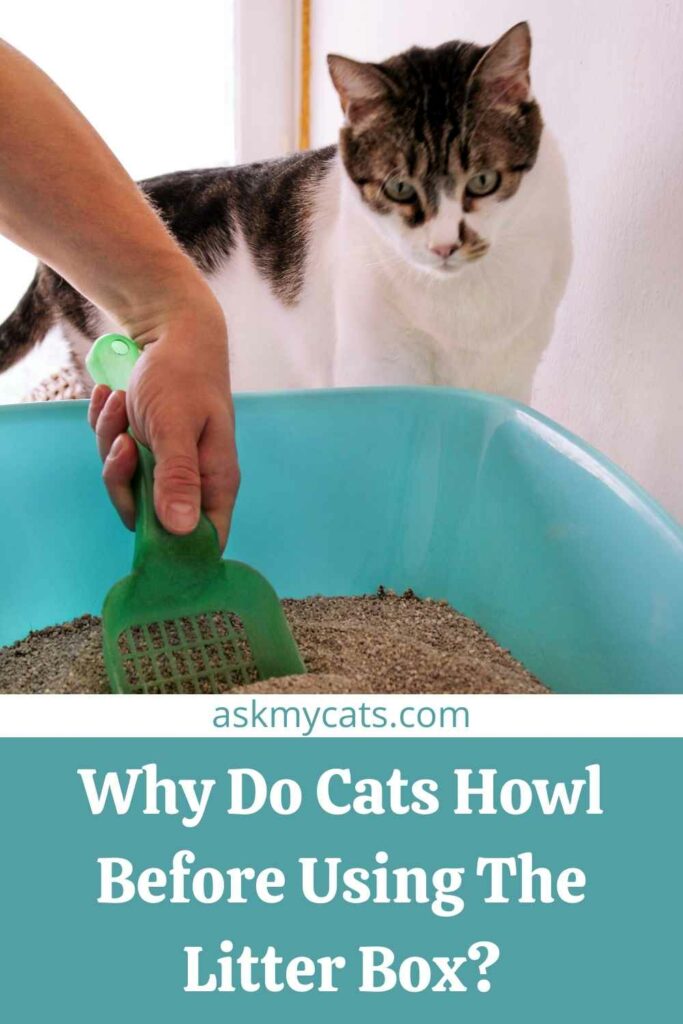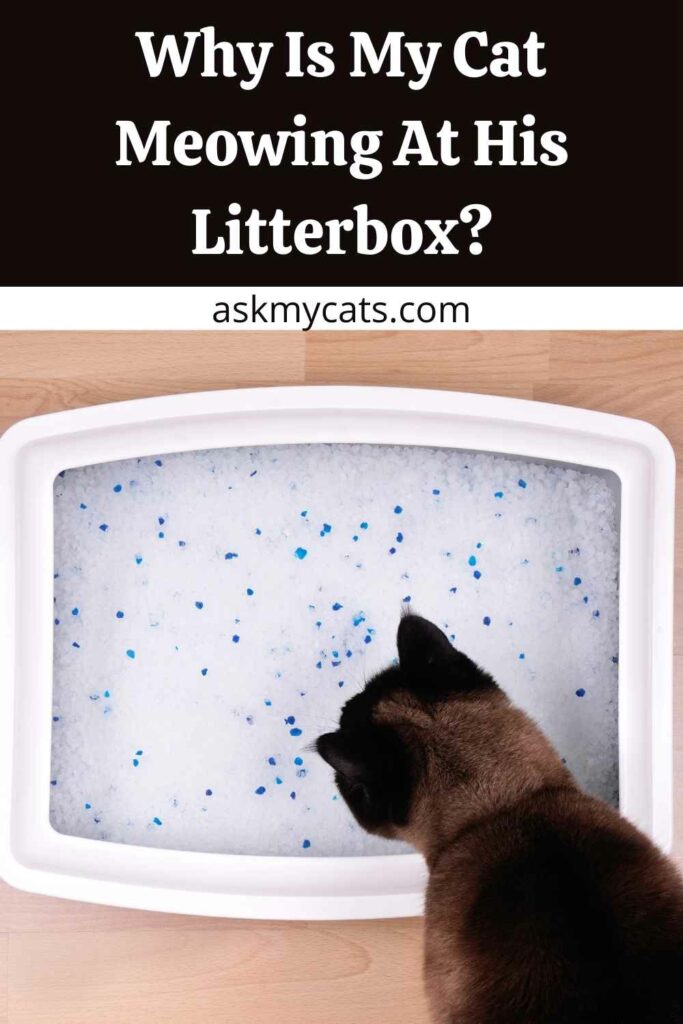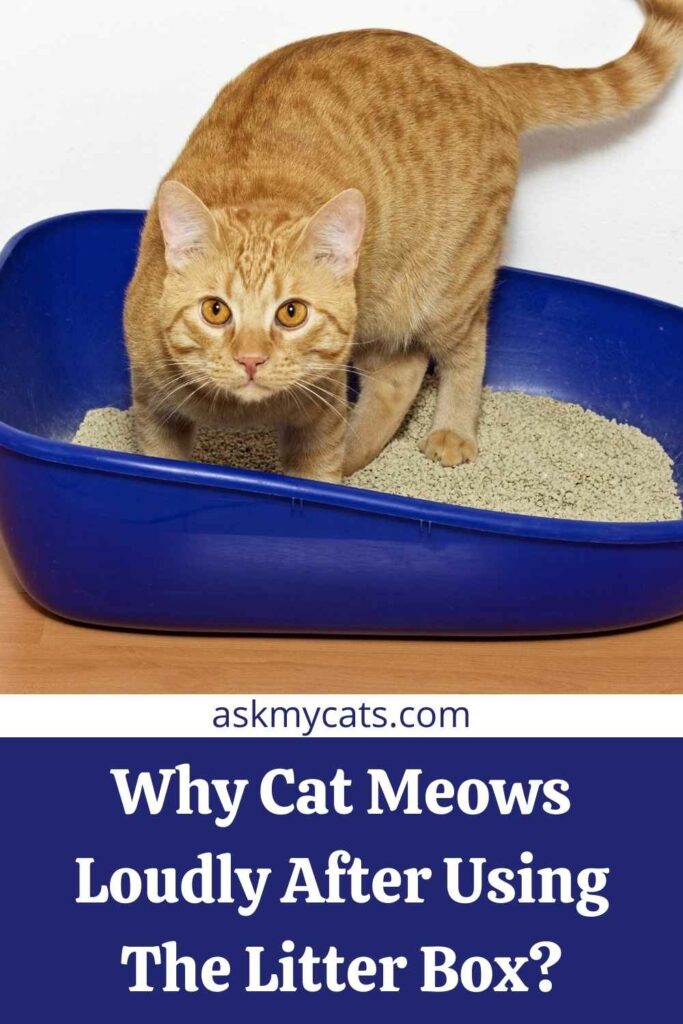Since this is a delicate moment for cats, they keep their bathroom habits hidden. A cat cannot flee a predator or a threat while using the litter box. Cats usually like to defecate and pee fast, cover it up to hide the evidence, and move on. Occasionally, a cat will announce that it has used its tray, but why does this happen?
Before and after using the litter box, cats howl to communicate the physical discomfort, uncomfortable feelings, or irritation they are experiencing when passing the bowel. It’s also likely that they want to ensure that no one bothers them when using the litter box.
When they’ve finished using the litter box, howling might be interpreted as a sign to clean the litter box.
If your cat vocalizes, it might indicate discomfort or other health issues. So, in this article, we’ll go over each of these reasons in-depth, as well as address other typical litter box issues that cat owners frequently ask, such as if cats prefer privacy before they defecate, why do cats rush after they poop, and so on.


Give Your Cat the Perfect Day
Get the Free Ebook!
Why Do Cats Howl Before Using The Litter Box?
It might be a matter of habit or an indication of a health problem that your cat is experiencing. A Urinary Tract Infection (UTI) or cystitis are just a couple of instances of possible issues.

Being a cat owner comes with a lot of obligations, but it’s all worth it when you witness your four-legged fluffy friend’s loving adoration. Cats are intriguing creatures with their own set of peculiar and expected behaviours.
If this is something your cat regularly does, it’s unlikely that it’s something to be concerned about.
However, if you’ve only lately realized this, you should investigate. The truth is that you know more about your cat than anybody else. If you get a negative feeling about anything out of character, take action.
Suppose the meowing is higher pitched or occurs more frequently than usual. It’s preferable, in my view, to get her examined by your veterinarian as soon as possible to be on the safe side.
Cats might become a little confused as they become older. They do things that are out of the ordinary. There have been reports of cats making similar sounds after using the litter pan, and it’s not something to be concerned about; it’s more likely to be due to age-related disorientation.
Ignoring your cat when she meows, as tempting as it may seem, is not the solution. You might not want to reward her for her constant meowing. The truth is that she’s attempting to reach out to you for a purpose.
Why Is My Cat Meowing At His Litterbox?
When a cat meows at his litter box, it may indicate that it is in discomfort. It might also mean stress or just a habit developed by a boisterous cat.

Because pain during urination might be a sign of a medical problem, if your cat starts meowing while using the litter box, take it seriously and consult your veterinarian right once.
A male cat’s urethra can become stopped or almost blocked in various instances. This is a potentially fatal condition. If you experience any of the following symptoms, contact your veterinarian or an emergency vet facility right once.
When a cat meows in the litter box, it might be a symptom of discomfort or suffering, or it could be an indication of behavioural problems. If you suspect your cat is in distress, you should take them to the veterinarian right once. We’ll go over the different causes to see what troubles you could be facing.
Pain during peeing in cats usually indicates amiss with their urinary tract. This is referred to as FLUTD (Feline Lower Urinary Tract Disorder). FLUTD is a catch-all phrase that refers to crystals in the urine that can lead to obstruction or infection.
Male Cat Meowing In Litter Box
Male cats like not to be disturbed while in the litterbox. As a result, they may howl before pooping to alert predators that they are at their most vulnerable. This is generally seen as usual and not a cause for concern.
Cats wailing before and after using the litter box are a common yet peculiar behaviour that almost every cat owner has encountered at least once.
If your cat yowls a lot before, during, and even while pooping, and if this is a new symptom for her, she might be in pain and discomfort.
It might signify a gastrointestinal obstruction or hairballs in the gut, making defecation difficult and uncomfortable. In this case, you should take the cat to the veterinarian right once to determine the source of the suffering.
Cats despise having their litter box soiled. As a result, cats may howl before using the litter box if it needs to be cleaned, and if they yowl after pooping, you should clean the litter box as soon as possible since she values hygiene and presumably despises the scent of dirty litter.
After discharging their business into the litter box, your cat may roar and meow loudly to communicate their feelings of contentment, joy, and a sudden rush of energy. They are relieved to have gotten rid of the garbage and to feel lighter.
If your cat’s litter training were recently completed, she would howl for an award after using the litter box. This is most common in newborn kittens who are accustomed to receiving rewards every time they defecate, but this tendency must be changed as they get older.
Pet your cat, but don’t connect pooping time with rewards. Otherwise, you’ll have to put up with their cries and meows every time they defecate.
Why Do Cats Howl After They Poop?
Cats howl after they poop because they feel stressed.
It’s essential to take loud crying after pooping seriously since it might suggest underlying health issues. If your cat has begun to wail and cry more than expected, it might indicate constipation or diarrhoea, which could be causing her to have difficulty and strain using the litter box.
Crying might sometimes indicate that your cat is constipated and needs your assistance. It’s also conceivable that she’s having trouble making bowel movements because of a blockage in her gut.
Hairballs and small obstructions are usually passed by pooping in cats, but if anything cannot be given, your kitty will scream while attempting to do so.
If you have replaced their previous litterbox with a new one, your cat may scream due to the changes in the litterbox.
Cats do not adapt well to change, and even a minor alteration in their litter box might cause them to be hesitant to defecate, which they will communicate by screaming after pooping. A dirty litter box might also be an issue.
Kitten Meows When Pooping
Kittens meow when pooping because they feel uncomfortable while pooping.
Kittens meow to indicate that they are going to the restroom. While in this motionless pose, they instinctively meow to warn away predators. Meowing before defecation is also linked to kittens with urinary tract infections or uncomfortable bowel motions.
If your kitten has always meowed before using the litter box, there’s no need to be concerned. However, if your kitten does not usually meow before pooping or if his meow is a higher-pitched “weeping” sound, there may be a medical problem that has to be addressed.
Suppose your kitten has adopted this behaviour recently, has a high-pitched meow, or has any other strange indicators such as straining or other discomfort symptoms. In that case, it’s time to take him to the doctor.
Urinary crystals, often known as UTIs, are a common problem. Not just when your kitten is peeing but also when it has a bowel movement; this might be uncomfortable. The urethra might get irritated when the bowel movement goes down, producing discomfort.
Why Cat Meows Loudly After Using The Litter Box?
If a cat meows loudly after using the litterbox, he is suffering from urinary issues.

Your cat might be suffering from Cystitis. Your cat may be having trouble urinating, which may be uncomfortable, resulting in meowing. Frequent urination, blood in the urine, peeing outside the litter box, and over-grooming around the hind end are indications of Cystitis.
There might be a clog in your cat’s intestines. It may be difficult, if not impossible, to pass a bowel movement as a result of this. The veterinarian will most likely use abdomen x-rays or ultrasonography to determine whether there is a blockage.
Worms might be present in your cat. Keep an eye on the consistency of your cat’s excrement and check for worms in the waste or around its bottom.
In other cases, your cat may require a trip to the veterinarian and the administration of dewormer. It’s also possible that your cat is old or has an upset stomach, making it difficult for it to use the potty.
Frequently Asked Questions
Why does my kitten meow when digging in the litterbox?
When kittens go to the potty, they may exhibit this strange yet typical activity. Most cat owners are anxious when they hear their kitten meow before they defecate or pee, but this habit does not always mean something is wrong. However, a potential health issue should not be discounted.
How often should a kitten poop?
While a kitten should pee every few hours, depending on their age, care, and GI health, they may pass feces anywhere from 1 to 6 times per day. A kitten may go for up to 24 hours without pooping. Don’t worry if this happens; instead, keep an eye on them and attempt to go pee.
Why do cats meow when pooping?
Yowling usually indicates that a cat is distressed, lost, or in some form of bodily discomfort. When a cat yowls before or during defecation, it might mean that they have trouble passing a bowel movement, which is commonly caused by constipation.
Final Words
A cat’s howling and yowling before and after feces is a common occurrence. Still, he may be expressing specific health difficulties and troubles by wailing and sobbing. As a result, one must pay attention to this.
Drop your questions in the comments section below.
